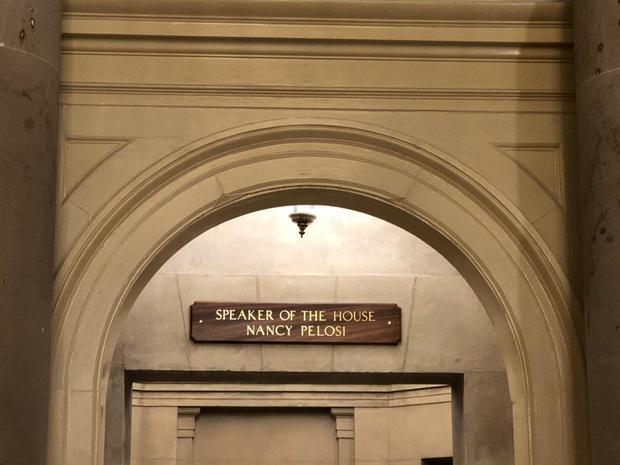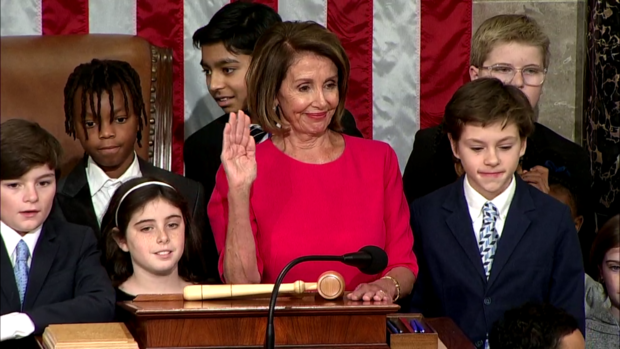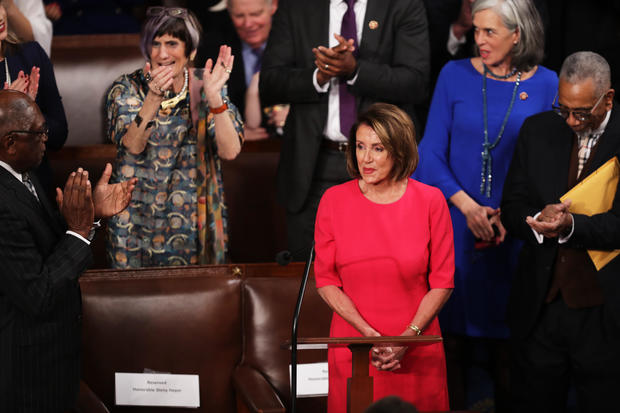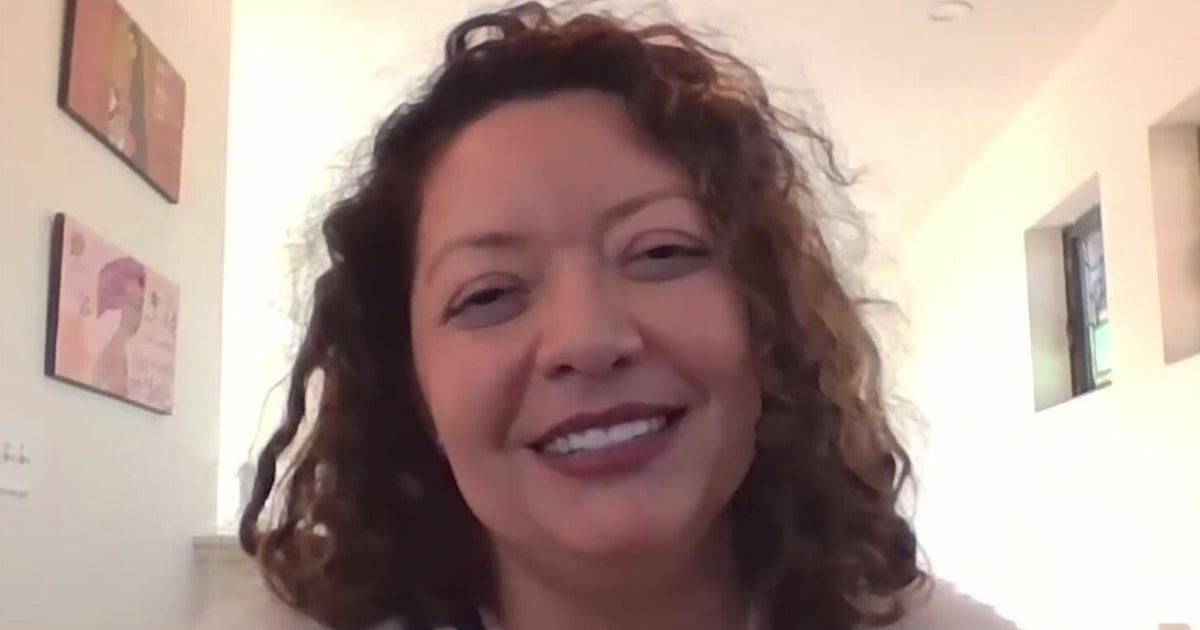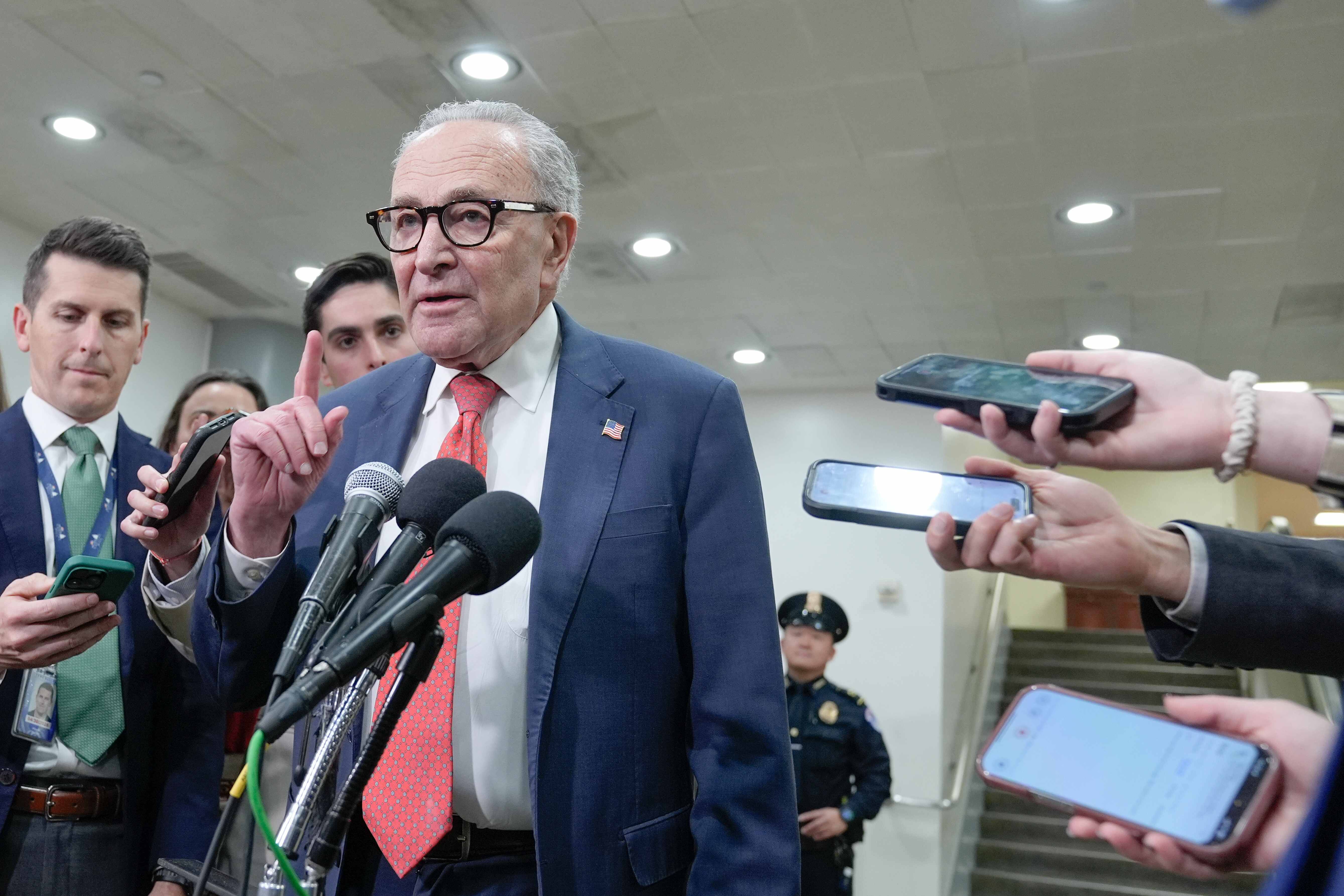New Congress: House votes to reopen government but no end in sight to shutdown - live updates
The 116th Congress was seated Thursday, with Democrats taking the majority in the U.S. House of Representatives after eight years out of power. The first order of business was electing Rep. Nancy Pelosi to be House speaker for the second time.
Within hours of Pelosi taking the speaker's gavel, the House voted to reopen the government without funding for the border wall. But the legislation is considered dead on arrival in the Senate and President Trump has insisted he will veto any legislation that does not include border wall funding.
Mr. Trump congratulated Pelosi on her victory in a surprise statement to reporters in the White House briefing room Thursday afternoon.
Live updates of the new Congress follow below:
House passes bill to reopen the government
The House passed a bill to reopen the government 241-190, but it has no money for the border wall President Trump is insisting on. Seven Republicans voted for the measure.
That legislation and a Homeland Security funding bill are considered dead on arrival in the Senate, and Mr. Trump has vowed to veto bills without the funding for the wall.
Democrats say these bills are identical to bills that have either passed the full Senate with an overwhelmingly bipartisan vote or passed the Senate Appropriations Committee unanimously.
Democrats vote to fund Homeland Security without wall
The House approved a measure to fund Homeland Security on an interim basis but without the funding for the border wall. The bill passed 239 to 192, getting a "yes" vote from five Republicans.
President Trump has promised to veto any bill that does not include border wall funding.
Democrats approve House rules package
Reporting by Rebecca Kaplan.
The Democratic-controlled House passed the bulk of a package of rules that will govern the chamber during the new congressional session.
The major changes approved by lawmakers include:
- A rule that bars lawmakers from discriminating on the basis of sexual orientation or gender identity and requires representatives to pay out-of-pocket for any discrimination claims settled against them.
- A rule that permits House members to wear religious head coverings. This allows Muslim American Congresswoman Ilhan Omar, D-Minnesota, to wear a headscarf on the House floor.
- The "Gephardt rule" that automatically raises the debt ceiling when the House passes a budget. This is designed to avert any debt ceiling crises.
Now in majority, House Democrats reiterate they won't fund border wall
If the message wasn't clear already, new Speaker of the House Nancy Pelosi and her colleagues made it so -- they won't support funding for President Trump's border wall.
"We're not doing a wall. Does anybody have any doubt that we're not doing a wall?" Pelosi energetically reiterated in an evening press conference, just hours after she retook the gavel to be, once again, the first and only female speaker of the House.
Now in the majority, House Democratic leaders before they left for the night wanted to reiterate their demands to re-open the government.
"We are diligent and persistent in trying to open up government. We will take ideas--good ideas from wherever they come," Pelosi said.
House Democrats want to reopen government by passing funding legislation with a mix of bills the Senate has already approved and using a short-term funding mechanism to allow for more debate over the Homeland Security funding until Feb. 8.
Stuck between the dueling political parties over the shutdown are around 800,000 furloughed federal government employees.
CBS News correspondent Nancy Cordes asked Pelosi if these furloughed workers will ultimately push Democrats to accept President Trump's demands for billions of dollars in border wall funding.
"The president cannot hold public employees hostage because he wants to have a wall," Pelosi responded, and noted the president's campaign promise that Mexico would pay for the border wall.
"C'mon let's anchor ourselves into reality, Mexico is not going to pay for this wall, so no," the speaker ultimately replied.
This negotiation over funding and how to re-open the partially-closed government will continue in a Friday morning meeting at the White House.
Republican women to serve on Senate Judiciary for first time
Two Republican women will serve on the Senate Judiciary Committee for the first time.
Sen. Marsha Blackburn of Tennessee and Sen. Joni Ernst of Iowa will both have places on the committee. Republicans were criticized last year during the Brett Kavanaugh hearings when not a single woman sat on the panel to question the nominee's judgement in the wake of misconduct allegations. Christine Blasey Ford, who alleged Kavanaugh assaulted her when she was a teenager, was only questioned by Republican men.
Pence talks border security outside Pelosi's office
The vice president, who is the president of the Senate, spent the day on Capitol Hill swearing in senators.
Pence said he looked forward to meeting with congressional leaders again on Friday about the government shutdown over border security.
"We're going to continue to engage Democrats and Republicans to come together and to achieve the kind of agreement that will provide the border security that the American people need," Pence said.
Pence reiterated the White House plans to continue to hold strong on their calls for a wall at the southern border and promised "to stand until we achieve real measurable progress that we secure our borders. The American people deserve nothing less."
As the vice president departed, he shook hands and spoke with members of the public.
New speaker signage
Shortly after Speaker Pelosi was administered the oath of office, Capitol architects quickly scaled a ladder outside her Capitol office and made the speakership official with a new sign: "SPEAKER OF THE HOUSE NANCY PELOSI" Several Pelosi supporters whooped with excitement when they returned to see the new sign hanging above the entryway.
House to vote on bills to reopen the government
The Democratic-controlled House is scheduled to vote on six appropriations bills to fund most of the government and a continuing resolution to fund the Department of Homeland Security (DHS) until Feb. 8.
Because Democrats' proposals do not include any additional funding to construct a wall along the U.S.-Mexico border, it is unlikely that they will be backed by the president and a Republican-controlled Senate.
White House director of strategic communications Mercedes Schlapp told reporters on Thursday the president preferred long-term budget legislation to fund all agencies for an entire year, over a short-term spending measure. "DHS is part of the federal government, they should be able to be funded as well," she said.
Pelosi takes the oath of office for speaker
Pelosi invited her grandchildren and all other children in the audience to join her at the front of the chamber as she took the oath of office. The oath was administered by the dean of the House, GOP Rep. Don Young of Alaska.
A beaming Pelosi swore to defend the Constitution. "Congratulations, Madame Speaker," Young said as the confirmation ended.
"I now call the House to order on behalf of all America's children," Pelosi said to cheers. She then released the children behind her to join their parents, but a number decided they would rather stand with her.
Pelosi then swore in members of the House of Representatives. The members dutifully took their oath, and were congratulated by Pelosi.
Nancy Pelosi gives speech accepting speaker's gavel
Newly elected Speaker Nancy Pelosi gave a speech after accepting the gavel from House Minority Leader Kevin McCarthy. She began by praising the over 100 women in the House, the largest number in history.
She said that the overwhelming victory of Democrats at the polls in November showed that the public wanted the House to challenge the president.
"Our nation is at an historic moment. Two months ago, the American people spoke, and demanded a new dawn," Pelosi said. "They called upon the beauty of our Constitution: our system of checks and balances that protects our democracy, remembering that the legislative branch is Article I: the first branch of government, co-equal to the president and judiciary."
Pelosi said that Democrats must be "pioneers of the future" and "accelerate a future that advances America's preeminence in the world" by improving public education and workforce development. She also sounds a warning on climate change, calling it "a crisis manifested in natural disasters of epic proportions."
"This is a public health decision for clean air and clean water; an economic decision for America's global preeminence in green technology; a security decision to keep us safe; and a moral decision to be good stewards of God's creation," Pelosi said about the need for Congress to combat climate change.
She also referred to the "For the People" agenda, which Democrats campaigned on nationally, a package including bills on infrastructure, ethics reform, lowering health care costs and protecting those with pre-existing conditions. Pelosi mentioned other priorities as well, such as LGBT equality and implementing bipartisan background check legislation.
However, before Pelosi can achieve any of these goals, the partial government shutdown must end. President Trump is refusing to sign any legislation which does not include funding for a border wall, which Democrats in the House and Senate are unwilling to provide.
"We will debate and advance good ideas no matter where they come from - and in that spirit, Democrats will be offering the Senate Republican appropriations legislation to re-open government later today - to meet the needs of the American people, and to protect our borders," Pelosi said about the Democrats' immediate agenda.
After her speech, Pelosi introduced the first speaker pro tempore of the 116th Congress, Rep. Jim Langevin of Rhode Island. Langevin will be the first quadriplegic speaker pro tempore.
Minority Leader Kevin McCarthy passes gavel to Pelosi
Minority Leader Kevin McCarthy gave a speech before presenting the gavel to Pelosi, effectively passing power from the Republican Party to the Democratic Party in the House.
In his speech, McCarthy outlined the differences between the Republican and Democratic Parties, but was respectful of Pelosi and her time in Congress.
"While we seek cooperation, there is one core principle upon which we will not compromise. Republicans will always choose personal freedom over government control," McCarthy said.
He said that Thursday marked "a new chapter in this house's pursuit of a more perfect nation."
"The country knows Nancy Pelosi as an experienced politician with three decades of service in Congress. A fighter for her cause. And a true trailblazer," he said. "Even when we disagree with one another completely, it is important to remember that we are bonded together in a common cause: our love for America."
"In that spirit, in the pursuit of a more perfect union, and in the unshakable belief that America was, is and will always be the greatest country on the face of the earth, I extend the hand of friendship to every member of this body," McCarthy concluded. "To the speaker of the House, Nancy Pelosi, I extend to you this gavel."
Who voted against Nancy Pelosi?
Fifteen Democrats did not vote for Pelosi for speaker. Twelve of them voted for other people, and three voted "present" instead of casting a vote.
The members who voted for candidates other than Pelosi are:
- Jason Crow (Colorado)
- Max Rose (New York)
- Jared Golden (Maine)
- Joe Cunningham (South Carolina)
- Abigail Spanberger (Virginia)
- Mikie Sherrill (New Jersey)
- Anthony Brindisi (New York)
- Ben McAdams (Utah)
- Ron Kind (Wisconsin)
- Conor Lamb (Pennsylvania)
- Kathleen Rice (New York)
- Kurt Schrader (Oregon)
Members who voted present:
- Jim Cooper (Tennessee)
- Elissa Slotkin (Michigan)
- Jeff Van Drew, who changed his vote from "no" (New Jersey)
Pelosi officially wins speakership
Pelosi has formally been elected speaker of the House, with 220 votes. Almost all Democrats voted for Pelosi, even after a brief rebellion in November when a faction of Democrats attempted to present an alternative as speaker nominee.
Several newly elected Democrats who made campaign promises not to vote for Pelosi as speaker kept to their word. New York Rep. Anthony Brindisi voted for former Vice President Joe Biden for speaker. Colorado Rep. Jason Crow voted for Sen. Tammy Duckworth, as did New York Rep. Max Rose.
Rep. Joe Cunningham of South Carolina voted for Rep. Cheri Bustos, as did Maine Rep. Jared Golden, Virginia Rep. Abigail Spanberger and New Jersey Rep. Mikie Sherrill.
Pennsylvania Rep. Conor Lamb voted for Rep. Joe Kennedy III. Utah Rep. Ben McAdams voted for Rep. Stephanie Murphy. New Jersey Rep. Jeff Van Drew simply voted "no." He then amended it to vote "present."
Rep. Jim Cooper, who has represented a district in Tennessee for decades, voted "present," as did new Michigan Rep. Elissa Slotkin. New York Rep. Kathleen Rice, a leader of the anti-Pelosi movement, voted for Georgia gubernatorial candidate Stacey Abrams, and Rep. Kurt Schrader voted for Rep. Marcia Fudge.
Although most Republicans voted for House Minority Leader Kevin McCarthy, a few voted for Rep. Jim Jordan, a leader of the Freedom Caucus.
Liz Cheney nominates Kevin McCarthy
Rep. Liz Cheney, the new Republican conference chairwoman, nominated Minority Leader Kevin McCarthy to serve as speaker of the House. Most, if not all, Republicans are expected to vote for McCarthy.
There were no further nominations for the speakership.
Hakeem Jeffries nominates Pelosi for speaker
Rep. Hakeem Jeffries, D-New York, nominated Pelosi to be the speaker of the House. Jeffries is the new House Democratic Caucus chairman.
When he announced her nomination, the Democratic caucus and some members on the Republican side gave her a standing ovation.
"Without question, Nancy Pelosi has a track record of legislative success that is unparalleled in modern American history," Jeffries said in his nomination speech. He noted how Pelosi oversaw the passage of the Affordable Care Act in 2009 as speaker.
"In the 116th Congress, she will continue to fight hard for the people," Jeffries said. "House Democrats are down with NDP: Nancy D'Alesandro Pelosi, the once and future speaker."
Celebrities in the audience as Pelosi is elected
Tony Bennett, the jazz great and friend of Pelosi, left her new Capitol office and headed towards the House gallery to watch the vote. Bennett did not answer questions.
"Project Runway" host Tim Gunn is also in the speaker's reception and expected to attend the swearing in, as well. Gunn said about Pelosi, "She exudes polish, confidence, elegance, grace and power. And I'm a fan of her fashion."
Pelosi's daughter reacts to mother being elected speaker
Reporting by Bo Erickson
Pelosi's daughter, Christine, told CBS News that her mother spent the morning doing the "things moms do" like combing her granddaughter's hair and making sure everyone in the family looked "spiffy."
"We have been waiting 8 years for this, working 8 years for this," she added. "She is as always focused being a grandmother and being speaker."
The younger Pelosi also said that her mother is excited to be serving with over 100 women in the House in the 116th Congress.
In an interview on CNN's "New Day" Wednesday, Alexandra Pelosi, another one of Pelosi's daughters, said that her mother would handle the speakership with an iron fist.
"She'll cut your head off and you won't even know you're bleeding," Alexandra Pelosi said. "That's all you need to know about her."
Clerk calls House to order
The House has been called to order. Before Pelosi is voted in as speaker, the clerk will initiate a quorum call.
The House clerk noted that North Carolina's 9th congressional district remains in dispute and she has received no credentials to fill it.
Pelosi is set to be nominated for speaker by Democratic Caucus Chairman Hakeem Jeffries, D-New York.
Nancy Pelosi to be elected speaker
Rep. Nancy Pelosi, D-Calif., is expected to be elected House speaker when the session is gaveled in on Thursday. Pelosi has been praised by Democrats recently for standing up to President Trump amid a shutdown fight.
In her speech after accepting the gavel, Pelosi is expected to discuss Democratic priorities, including income inequality and climate change.
"When our new members take the oath, our Congress will be refreshed, and our democracy will be strengthened by the optimism, idealism and patriotism of this transformative freshman class. Working together, we will redeem the promise of the American Dream for every family, advancing progress for every community," Pelosi says in an excerpt of the speech provided for reporters.
In November, there was an effort by opponents to then-Minority Leader Pelosi to replace her as the longtime leader of House Democrats and presumptive speaker. The drive was led by Reps. Seth Moulton, D-Mass., Tim Ryan, D-Ohio, and Kathleen Rice, D-New York, but ultimately no candidate stepped up to challenge Pelosi.
Rep. Marcia Fudge, D-Ohio, briefly mulled a bid for speaker, but announced her support for Pelosi after she was promised a plum position as chair of the Elections Subcommittee of the Committee on House Administration. Without a clear challenger, and with only 16 Democrats signing a letter pledging to vote against her, the opposition to Pelosi dissipated.
A few members who flipped Republican districts are still expected to oppose Pelosi as speaker, such as New York Rep. Max Rose and Virginia Rep. Abigail Spanberger, following up on campaign promises to oppose her speakership. However, they may vote "present" instead of directly voting against her.
House votes on Democrats' rules package
One of the first hurdles for the newly-sworn in House members is approving a rules package to govern conduct in the upcoming Congress.
Some notable provisions include reviving the "Gephardt rule," named for former House Majority Leader Dick Gephardt, which automatically raises the debt ceiling when the House passes a budget. Members would be required to have additional ethics training, and would be prohibited from serving on corporate boards. One provision would also amend the rule against wearing hats on the House floor to have religious exceptions, so that incoming Rep. Ilhan Omar, a Muslim, may wear her headscarf.
Another notable provision would change the process to "vacate the chair," a process to force out the speaker. Instead of only one member being able to trigger the process, the new rule would require motion to vacate to only be offered on the House floor if a majority of either party conference agrees to do so.
However, some progressive Democrats have announced that they will vote against the rules package, which was rolled out Tuesday evening. Although the package includes bills which would create a committee on climate change and implement ethics reforms, some representatives are basing their opposition on the inclusion of the "pay as you go" rule.
The "pay as you go" rule, commonly known as PAYGO, requires that any increase in entitlement spending be offset by cuts in other entitlement programs, or by new revenue raisers, in order to prevent the deficit from increasing. The deficit jumped by 17 percent in 2018, after the $1.5 trillion tax overhaul passed in 2017. While managing a yawning deficit may be a priority for presumed incoming House speaker Nancy Pelosi, it angers progressives who oppose cutting some entitlement spending in order to increase funding for other programs.
House to vote on government funding bill
The most critical item on the agenda on Thursday is passing a bill to fund the government. A partial shutdown has been in effect since Dec. 21, affecting hundreds of thousands of furloughed workers. Congress failed to pass a bill funding the Department of Homeland Security and several other agencies in December, as President Trump is refusing to sign any measure which does not include sufficient funding for a border wall.
In an interview with "TODAY" Thursday morning, Pelosi said that she was completely unwilling to provide funding for the border wall.
"We can go through the back and forth. No. How many more times can we say no? Nothing for the wall," she said.
Mr. Trump and congressional leaders met Wednesday afternoon in the Situation Room to discuss a possible deal over wall funding. The Situation Room, intended for highly classified material, is by nature closed to the press, meaning there will be no televised theatrics like the infamous meeting in December when Mr. Trump told Senate Minority Leader Chuck Schumer and Democratic leader Nancy Pelosi he would be "proud" to shut down the government over border security.
Pelosi and Senate Minority Leader Chuck Schumer unveiled a package of bills to reopen the government Monday, including one bill to temporarily fund the DHS, with $1.3 billion for border security, through Feb. 8.
It will also include six other bipartisan bills to fund the departments of Agriculture, Interior, Housing and Urban Development and others closed by the partial shutdown through the remainder of the fiscal year, to Sept. 30.
However, as the package does not include the $5 billion Mr. Trump wants for the wall on the southern border, he is unlikely to support it. McConnell spokesman Donald Stewart made it clear Senate Republicans will not take action without Mr. Trump's backing. "It's simple: The Senate is not going to send something to the president that he won't sign," he said Monday.
Mr. Trump also said after a meeting with members of Congress that approving bills to fund other government agencies while not funding DHS would make him "look foolish."
The package includes one bill to temporarily fund the Department of Homeland Security, with $1.3 billion for border security, through Feb. 8.
Who are the new committee chairs?
Reporting by Caitlin Huey-Burns
When Democrats officially take control, a group of President Trump's top critics will have new powers.
Until now, the highest ranking Democratic lawmakers on key committees have had limited reach, essentially relegated to voicing their concerns through cable news programs and social media. Now, the change in power, issuing from November's midterm elections, not only gives them a megaphone but also real legislative tools, like the power to issue subpoenas, to hold the president to account on everything from his tax returns and business dealings to the Russia investigation to administration scandals and his immigration policies.
Here are five members to watch in the New Congress and what they hope to achieve:
New York Rep. Jerry Nadler, chair of the House Judiciary Committee
Nadler says he's prioritizing oversight. His committee has already called upon acting Attorney General Matthew Whitaker because Democrats are concerned about the nature of his appointment and its relation to the Russia investigation. Nadler said that Whitaker has agreed to testify, but hasn't committed to a date. He says he'll issue a subpoena if necessary. The incoming committee chairman is also determined to protect the special counsel investigation led by Robert Mueller.
"For the last two years, the president has had no oversight, no accountability from Congress. The Republican Congress was completely derelict in its responsibility to provide oversight," Nadler told "CBS This Morning." "We're going to provide that oversight. We're going to use the subpoena power if we have to."
California Rep. Adam Schiff, chair of the House Intelligence Committee
When he takes the reins of the committee, Schiff has said he will focus the panel's efforts around protecting the Mueller investigation and re-engaging it in the overall probe. Schiff has also expressed interest in calling back witnesses related to the Russia investigation who have already testified. "We believe other witnesses were untruthful before our committee," Schiff said in November, after Trump's former attorney Michael Cohen pleaded guilty to lying to Congress.
Schiff has identified two key areas of interest when it comes to the Russian investigation and possible collusion between Trump associates: The details of the infamous Trump Tower 2016 meeting, which could involve issuing subpoenas for phone records, and whether Russians laundered money through the Trump organization.
Maryland Rep. Elijah Cummings, chair of the House Oversight and Reform Committee
If Democrats have been craving oversight of the president, they will certainly be watching Cummings, as the chair of the committee with oversight in its name. Cummings has said he would use his power to make Mueller's findings public. "What the public has said is they want accountability and transparency," Cummings told CBS' "Face the Nation." "I would do anything and everything in my power to have the findings presented not only to the Congress but to the people of the United States." Cummings has also said he would like Cohen to come before the committee. "The public needs to know exactly what happened," he told CNN's "State of the Union." "There's a lot to look at."
California Rep. Maxine Waters, chair of the House Financial Services Committee
Waters has become a hero of the the anti-Trump resistance--and a top target of the president's attacks. Now, she will become the first woman and first African-American chair of the Financial Services Committee, and she has her eye on the banks that lent Mr. Trump money.
As ranking member of the committee, Waters has been focused on Deutsche Bank, which lended Trump money after bankruptcies, and was also hit with a large fine for a $10 billion Russian money laundering scheme.
Massachusetts Rep. Richard Neal, chair of the House Ways and Means Committee
Unlike recent predecessors, the president has refused to release his tax returns. That could change once Neal takes the helm of the tax-writing Ways and Means Committee. "Yes, I think we will," Neal told the Associated Press whether he would request the president's taxes. "I hope that the president would do this on his own, largely because every president since Gerald R. Ford has voluntarily done this."
Mr. Trump has repeatedly declined to make his returns public, protesting that he is under audit. If he doesn't comply with Neal's request, the tax code provision allows the chairman to request the taxpayer's information from the Internal Revenue Service and the treasury secretary would have to produce it.
New Democrats to be sworn in
The new Democratic caucus is extremely diverse compared to previous ones, with over 100 women taking office. Members-elect Rashida Tlaib and Ilhan Omar are the first Muslim women sent to Congress, and Deb Haaland and Sharice Davids are the first Native American women elected to Congress. Ayanna Pressley is Massachusetts' first black member of Congress, and Abby Finkenauer is the first woman sent to Congress from Iowa. Of the 31 new Republicans, all of them are white, and only one is a woman.
The House speaker traditionally administers the oath of office. Members may choose to hold a religious text while doing so.
